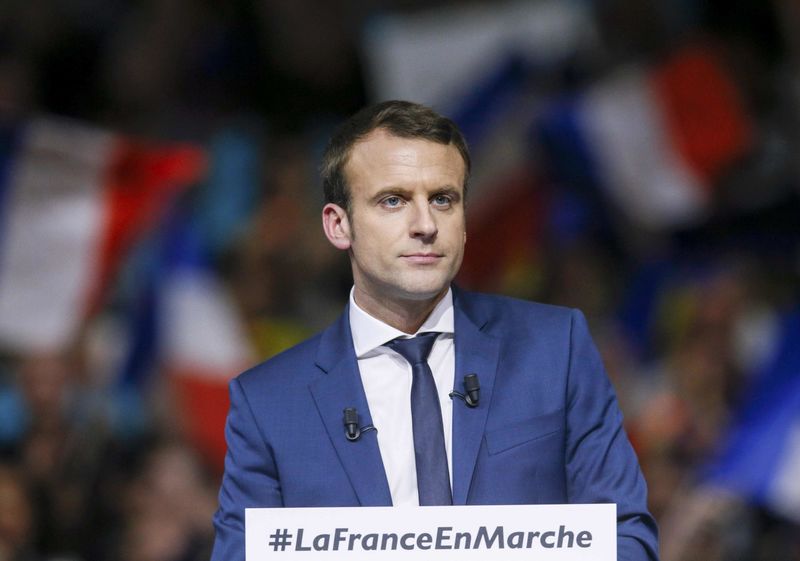Investing.com’s stocks of the week
By Sudip Kar-Gupta and Michel Rose
PARIS (Reuters) - France's presidential race sank deeper into smear and sleaze on Tuesday after centrist Emmanuel Macron was forced to deny an extramarital affair and conservative Francois Fillon pressed on with efforts to salvage his reputation.
A slump in support for Fillon after accusations that he used taxpayers' money to pay his wife for work she may not have done has propelled Macron into the top spot in opinion polls.
Late on Monday, Macron, a centrist former economy minister and ex-banker sought to kill rumors of a gay relationship outside his marriage to Brigitte Trogneux and push his campaign on.
"If you're told I lead a double life with Mr Gallet, it's because my hologram has escaped," Macron told supporters, referring to Radio France chief executive Mathieu Gallet.
A spokeswoman said the comments were "a clear denial of the rumors about his private life".
It is Fillon's campaign, though, that has been hit by scandal. On Monday he apologized for what he said was an error of judgment regarding the employment of family members, but said his wife's work had been genuine and legal and vowed to fight on.
In a voter survey published on Tuesday, 65 percent of respondents polled after he made his comments said they still wanted him replaced as candidate of the center-right, a figure that will do little to soothe anxieties within his party, The Republicans.
Le Canard Enchaine, the satirical weekly that broke the scandal involving Fillon's wife, Penelope, made new allegations on Tuesday. In addition to the roughly one million euros paid to her and two of the couple's adult children, the newspaper said she had also received severance pay totaling 45,000 euros ($48,105) over the years.
Fillon, who said on Monday he was a victim of "media lynching", hit back immediately with a statement in which he contested the figures given by the weekly.
"Not only does le Canard Enchaine try to cast doubt, wrongly, over the calculation of the net average salary of my wife but it commits numerous errors in analyzing information on the pay slips," he said.
"Only a desire to cause harm can explain this report which is full of lies," he said.
Heaping more pressure on the center-right party, it emerged that a magistrate had ordered ex-president Nicolas Sarkozy to stand trial over election financing irregularities - a reminder of the party's past brushes with financial scandal.
HISTORY OF SCANDAL
French politics has a long history of financial and personal scandals, and the country's media has become less shy about reporting the private life of public figures.
Photographs of current president Francois Hollande arriving outside the flat of actress Julie Gayet on the back of a motor scooter were splashed across front pages while he was officially still in another relationship.
Sarkozy's divorce in 2007 just months after his election and subsequent marriage to singer and model Carla Bruni were also widely covered.
And it was a sex-scandal that destroyed the presidential hopes of former IMF chief Dominique Strauss Kahn and gave Hollande his chance for the 2012 presidency.
Financial scandals have, however, always been fair game in the French media. One famous case during Sarkozy's presidency was the Elf oil company graft affair involving tens of millions of dollars in kickbacks for the leaders of African countries where the company was investing.
Former president Jacques Chirac was given a two year suspended prison sentence for misusing public funds in 2011, and Alain Juppe, whom Fillon beat to the conservative ticket last year, was convicted for a similar offense dating back to 2004.
Fillon has said he will step down if he ends up in court over the allegations against him - now the subject of an official investigation into whether his wife's work was fictitious or not.
On Tuesday, he launched a renewed attack on the legitimacy of the financial prosecutor conducting the investigation - a body that was set up in 2013 under Hollande.
"I now understand that it was naive to believe that justice would be served sensibly and rapidly," Fillon told fellow members of parliament.
UNCERTAINTY REIGNS
Uncertainty about the outcome of the election, taking place in two rounds on April 23 and May 7, has this week driven the premium that investors demand for holding French over German government debt to its highest for almost four years.
Opinion polls show Macron ahead of Fillon in the first round of the election, but only by a few percentage points, and behind Marine Le Pen, leader of the far-right National Front. She promises to take France out of the euro zone and hold a referendum on European Union membership.
Only the top two candidates go through to a second round on May 7. Polls show that Macron would beat Le Pen with about two thirds of the vote and that Fillon would win by a smaller, but still comfortable margin.
In its daily opinion poll update on Tuesday, pollster Opinionway left its first round score little changed from Monday, putting Le Pen on 25 percent, Macron on 23, and Fillon on 20.
It raised its prediction for the Macron vote in the second round to 66 percent from 65.
